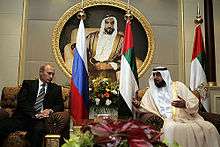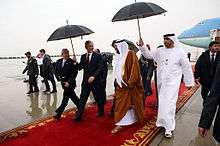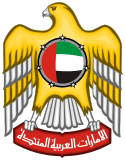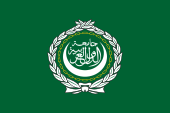Khalifa bin Zayed Al Nahyan
Khalifa bin Zayed bin Sultan Al Nahyan (Arabic: خليفة بن زايد بن سلطان آل نهيان; born 7 September 1948; referred to as Sheikh Khalifa) is the current President of the United Arab Emirates, the Emir of Abu Dhabi, the Supreme Commander of the Union Defence Force[2] and the chairman of the Supreme Petroleum Council. Sheikh Khalifa is also chairman of Abu Dhabi Investment Authority, which manages $875 billion in assets, the largest amount managed by a nation's head of state in the world.[3] Collectively, the Al Nahyan family is believed to hold a fortune of $150 billion.[4]
His Royal Highness Khalifa Al Nahyan | |
|---|---|
 Khalifa Al Nahyan in 2013 | |
| 2nd President of the United Arab Emirates | |
| Assumed office 3 November 2004 | |
| Prime Minister | Maktoum bin Rashid Al Maktoum Mohammed bin Rashid Al Maktoum |
| Preceded by | Zayed bin Sultan Al Nahyan |
| Ruler of Abu Dhabi | |
| Assumed office 2 November 2004 | |
| Preceded by | Zayed bin Sultan Al Nahyan |
| Personal details | |
| Born | Khalifa bin Zayed Al Nahyan 7 September 1948 Al Ain, Trucial States (now United Arab Emirates) |
| Spouse(s) | Shamsa bint Suhail Al Mazrouei (1964)[1]:48 |
| Children |
|
| Mother | Hassa bint Mohammed bin Khalifa Al Nahyan |
| Father | Zayed bin Sultan Al Nahyan |
Sheikh Khalifa succeeded his father, Zayed bin Sultan Al Nahyan, as Emir of Abu Dhabi on 2 November 2004 and became the President of the UAE the next day. As Crown Prince, he had already de facto carried out some aspects of the presidency since the late 1990s while his father was facing health problems.
In January 2014, Khalifa suffered a stroke but was in a stable condition.[5] He has since assumed a lower profile in state affairs, but retained presidential powers. His half brother Sheikh Mohammed bin Zayed Al Nahyan now carries out public affairs of the state and day-to-day decision-making of the Emirate of Abu Dhabi.[6]
Biography
Early life
Khalifa was born on 7 September 1948 at Qasr Al-Muwaiji, Al Ain, in Abu Dhabi (then part of the Trucial States), the eldest son of Zayed bin Sultan Al Nahyan, the Emir of Abu Dhabi, and Hassa bint Mohammed bin Khalifa Al Nahyan.[7][8] He is a graduate of the Royal Military Academy Sandhurst.
1966–1971
When his father, Zayed, became Emir of Abu Dhabi in 1966, Khalifa was appointed the Ruler's Representative (the mayor) in the Eastern Region of Abu Dhabi and Head of the Courts Department in Al Ain. Zayed was the Ruler's Representative in the Eastern Region before he became the Emir of Abu Dhabi. A few months later the position was handed to Tahnoun bin Mohammed Al Nahyan.[9]
On 1 February 1969, Khalifa was nominated the Crown Prince of Abu Dhabi, and on the next day he was appointed Head of the Abu Dhabi Department of Defense. In that post, he oversaw the build up of the Abu Dhabi Defense Force, which after 1971 became the core of the UAE Armed Forces.
Independence in 1971
Following the establishment of the UAE in 1971, Khalifa assumed several positions in Abu Dhabi: Prime Minister, head of the Abu Dhabi Cabinet (under his father), Minister of Defense, and Minister of Finance. After the reconstruction of the Cabinet of the United Arab Emirates, the Abu Dhabi Cabinet was replaced by the Abu Dhabi Executive Council, and Khalifa became the 2nd Deputy Prime Minister of the United Arab Emirates (23 December 1973) and the Chairman of the Executive Council of Abu Dhabi (20 January 1974), under his father.
In May 1976, he became deputy commander of the UAE Armed Forces, under the President. He also became the head of the Supreme Petroleum Council in the late 1980s, and continues in this position today, which grants him wide powers in energy matters. He was also the chairman of the Environmental Research and Wildlife Development Agency.
Presidency (2004–present)

He succeeded to the posts of Emir of Abu Dhabi and President of the United Arab Emirates (UAE) on 3 November 2004, replacing his father Zayed bin Sultan Al Nahyan, who had died the day before. He had been acting president since his father became ill prior to his passing.
On 1 December 2005, the President announced that half of the members of the Federal National Council (FNC), an assembly that advises the president, would be indirectly elected. However, half of the council's members would still need to be appointed by the leaders of the emirates. The elections were set to take place in December 2006.

In 2010, Khalifa was described in a WikiLeaks cable signed by then U.S. ambassador Richard G. Olson as a "distant and uncharismatic personage."[10] On 4 January 2010, the world's tallest man-made structure, originally known as Burj Dubai, was renamed the Burj Khalifa in his honor.[11]
In March 2011, Khalifa sent the United Arab Emirates Air Force to support the military intervention in Libya against Muammar Gaddafi, alongside forces from NATO, Qatar, Sweden and Jordan.[12][13]
Khalifa pledged the full support of the UAE to the Bahraini regime in the face of pro-democracy uprising in 2011.[14]
Later that year Khalifa was ranked as the world's fourth-wealthiest monarch, with a fortune estimated to be worth $15 billion.[15] In 2013, he commissioned Azzam, the longest motor yacht ever built at 590 ft (180 m) long, with costs between $400–600 million.[16][17]
In Fall 2011, the Emirates initiated a program to promote "allegiance" to Khalifa and other Emirati leaders.[18] The program continues, and encourages not only Emirati nationals, but residents from any nationality to register their "appreciation, recognition, and loyalty" to the Emirs.[19]
In January 2014, Khalifa suffered a stroke and was reported to have been in a stable condition after undergoing an operation.[20]
Investments and foreign aid
Seychellois government records show that since 1995 Khalifa has spent $2 million buying up more than 66 acres of land on the Seychelles' main island of Mahé, where his palace is being built.[21] The Seychelles' government has received large aid packages from the UAE, most notably a $130 million injection that was used in social service and military aid, which funded patrol boats for the Seychelles' antipiracy efforts. In 2008, the UAE came to the indebted Seychelles government's aid, with a $30 million injection.[21]
Khalifa paid $500,000 for the 29.8-acre site of his palace in 2005, according to the sales document. A Seychelles planning authority initially rejected the palace's building plans, a decision overturned by President James Michel's cabinet.[21] A month after the start of construction of the palace, the national utility company warned that the site's plans posed threats to the water supply. Joel Morgan, the Seychelles' minister of the environment, said the government did not tender the land because it wanted it to go to Khalifa. Morgan said "the letter of the law" might not have been followed in the land sale.[21] In February 2010, the sewage system set up by Ascon, the company building the palace, for the site's construction workers overflowed, sending rivers of waste through the region, which are home to more than 8000 residents.[21] Local government agencies and officials from Khalifa's office responded quickly to the problem, sending in technical experts and engineers. Government officials concluded that Ascon ignored health and building codes for their workers, and fined the company $81,000. Ascon blamed the incident on "unpredicted weather conditions".[21] Khalifa's presidential office offered to pay $15 million to replace the water-piping system for the mountainside., and Seychelles' government representatives and residents say Ascon has offered to pay roughly $8,000 to each of the 360 households that were affected by the pollution.[21]
In April 2016, Khalifa was named in the Panama Papers by[22] the International Consortium of Investigative Journalists; he reportedly owns luxury properties in London worth more than $1.7 billion via shell companies that Mossack Fonseca set up and administers for him in the British Virgin Islands.[23]
Titles, styles, honours and awards
Foreign honours
| Styles of President of the United Arab Emirates | |
|---|---|
 | |
| Reference style | His Highness |
| Spoken style | Your Highness |
| Alternative style | Ra'is |


Ancestry
| Ancestors of Khalifa bin Zayed Al Nahyan | |||||||||||||||||||||||||||||||||||||||||||||||||||||||||||||||||||||||||||||||||||||||||||||||||||||||||||||||||||||||||||||||||||||||||||||||||||||||||||||||||||||||||||||||||||||||||||||||||||||||||||||||||||||||||||||||||||||||||||||||||||||||||||||||||||||||||||||||||||||||||||||||||||||||||||||||||||||||||||||||||||||||||||||||||||||||||||||||||||||||||||||||||||||||||||||||||||||||||||||||||||||||||||||||||||||||||||||||||||||||||||||||||||||||||||||||||||
|---|---|---|---|---|---|---|---|---|---|---|---|---|---|---|---|---|---|---|---|---|---|---|---|---|---|---|---|---|---|---|---|---|---|---|---|---|---|---|---|---|---|---|---|---|---|---|---|---|---|---|---|---|---|---|---|---|---|---|---|---|---|---|---|---|---|---|---|---|---|---|---|---|---|---|---|---|---|---|---|---|---|---|---|---|---|---|---|---|---|---|---|---|---|---|---|---|---|---|---|---|---|---|---|---|---|---|---|---|---|---|---|---|---|---|---|---|---|---|---|---|---|---|---|---|---|---|---|---|---|---|---|---|---|---|---|---|---|---|---|---|---|---|---|---|---|---|---|---|---|---|---|---|---|---|---|---|---|---|---|---|---|---|---|---|---|---|---|---|---|---|---|---|---|---|---|---|---|---|---|---|---|---|---|---|---|---|---|---|---|---|---|---|---|---|---|---|---|---|---|---|---|---|---|---|---|---|---|---|---|---|---|---|---|---|---|---|---|---|---|---|---|---|---|---|---|---|---|---|---|---|---|---|---|---|---|---|---|---|---|---|---|---|---|---|---|---|---|---|---|---|---|---|---|---|---|---|---|---|---|---|---|---|---|---|---|---|---|---|---|---|---|---|---|---|---|---|---|---|---|---|---|---|---|---|---|---|---|---|---|---|---|---|---|---|---|---|---|---|---|---|---|---|---|---|---|---|---|---|---|---|---|---|---|---|---|---|---|---|---|---|---|---|---|---|---|---|---|---|---|---|---|---|---|---|---|---|---|---|---|---|---|---|---|---|---|---|---|---|---|---|---|---|---|---|---|---|---|---|---|---|---|---|---|---|---|---|---|---|---|---|---|---|---|---|---|---|---|---|---|---|---|---|---|---|---|---|---|---|---|---|---|---|---|---|---|---|---|---|---|---|---|---|---|---|---|---|---|---|---|---|---|---|---|---|---|---|---|---|---|---|---|---|---|---|---|---|---|---|---|---|---|---|---|---|---|---|---|---|---|---|---|---|---|---|---|---|---|---|---|---|---|---|---|---|---|---|---|---|---|---|---|---|---|---|---|---|---|
| |||||||||||||||||||||||||||||||||||||||||||||||||||||||||||||||||||||||||||||||||||||||||||||||||||||||||||||||||||||||||||||||||||||||||||||||||||||||||||||||||||||||||||||||||||||||||||||||||||||||||||||||||||||||||||||||||||||||||||||||||||||||||||||||||||||||||||||||||||||||||||||||||||||||||||||||||||||||||||||||||||||||||||||||||||||||||||||||||||||||||||||||||||||||||||||||||||||||||||||||||||||||||||||||||||||||||||||||||||||||||||||||||||||||||||||||||||
See also
- List of current heads of state and government
- List of rulers of separate Emirates of the United Arab Emirates
- List of the richest royals
- Sheikh Zayed bin Sultan Al Nahyan
- Mohammed bin Zayed Al Nahyan
- Sheikh Issa bin Zayed al Nahyan
References
- (PDF) https://www.na.ae/en/Images/LIWA04.pdf. Retrieved 5 February 2017. Missing or empty
|title=(help) - "Khalifa bin Zayed Al-Nahyan". Forbes. Retrieved 26 June 2012.
- "Asset-backed insecurity". The Economist. 17 January 2008. Retrieved 13 November 2017.
- Pendleton, Devon (11 March 2009). "The Gulf's Newest Billionaire". Forbes. Retrieved 11 April 2013.
- "Sheikh Khalifa's condition stable as he recovers from stroke". The National. Abu Dhabi. 25 January 2014. Retrieved 16 July 2014.
- "UAE president stable after suffering stroke". Financial Times. 26 January 2014.
- "Sheikha Hessa, mother of Sheikh Khalifa, dies". The National. United Arab Emirates. Retrieved 28 January 2018.
- "The UAE President". Crown Prince Court. Retrieved 18 October 2017.
- "Entrepreneur - Start, run and grow your business". Entrepreneur.
- Coker, Margaret (29 November 2010). "Leaked Papers Show Arab Leaders Critical of Iran, Neighbors". The Wall Street Journal.
- "World's tallest building opens in Dubai". BBC News. 4 January 2010. Retrieved 11 April 2013.
- "UAE updates support to UN Resolution 1973". WAM. 25 March 2011. Archived from the original on 6 April 2016.
- "Libya Live Blog – March 24". Al Jazeera. 24 March 2011. Archived from the original on 24 March 2011. Retrieved 25 March 2011.
- "Khalifa stresses UAE support to Bahrain". Khaleej Times. 3 March 2011.
- "The World's Richest Royals". Forbes. 29 April 2011. Archived from the original on 6 October 2011.
- "Emirati royals knock Abramovich off top of yacht league". CNBC. 14 August 2013. Retrieved 13 November 2015.
- Daniel Fisher (5 April 2012). "German Shipyard Launches World's Largest Private Yacht At 591 Feet". Forbes. Retrieved 17 March 2014.
- "Want to pledge allegiance to the president of the UAE? With this website, you can! The Next Web". 8 November 2011.
- "Our Allegiance to Sheikh Khalifa".
- "Sheikh Khalifa's condition stable as he recovers from stroke". The National. Abu Dhabi. 25 January 2014. Retrieved 16 July 2014.
- Margaret, Coker (9 September 2010). "Sheikh Abode a Sore Point in Seychelles". Wall Street Journal. Retrieved 16 February 2012.
- "Panama Papers: The Power Players". International Consortium of Investigative Journalists. Retrieved 3 April 2016.
- Adam Lusher (5 April 2016). "Panama Papers: 12 world leaders linked to offshore dealings – and the full allegations against them". The Independent.
- "Boletín Oficial del Estado" (PDF).
- https://c7.alamy.com/comp/E258HN/the-president-of-the-united-arab-emirates-his-highness-sheikh-khalifa-E258HN.jpg
External links
| Wikimedia Commons has media related to Sheikh Khalifa bin Zayed Al Nahyan. |
- Sheikh Khalifa Bin Zayed at the Wayback Machine (archived 31 January 2018) Biography of U.A.E. President
Khalifa bin Zayed Al Nahyan House of Al Nahyan Born: 25 January 1948 | ||
| Regnal titles | ||
|---|---|---|
| Preceded by Zayed bin Sultan Al Nahyan |
Emir of Abu Dhabi 2004–present |
Incumbent |
| Political offices | ||
| Preceded by Zayed bin Sultan Al Nahyan |
President of the United Arab Emirates 2004–present |
Incumbent |

